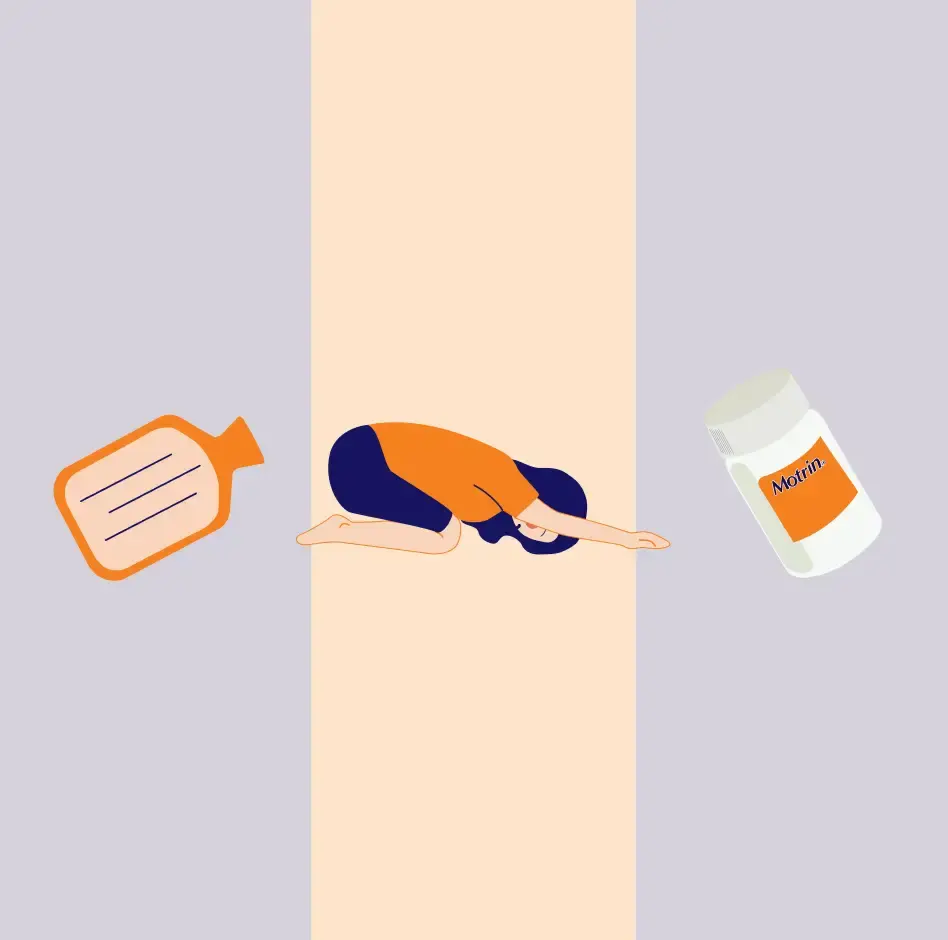What Causes Period Cramps (Dysmenorrhea)?
The cramping pain that comes before and during a period is caused by natural chemicals called prostaglandins that are made in the lining of the uterus. During menstruation, prostaglandin levels are higher, causing the muscle and blood vessels in the uterus to contract (tighten up). These contractions help shed the uterine lining during your period. Prostaglandin levels are at their peak before menstruation and decrease once you get your period, which is why cramping often eases up a few days in.[2]
Here are some other conditions that may cause period-like pain.[3,4,5]
Endometriosis — when tissue that is similar to the lining of the uterus grows outside of it on fallopian tubes, ovaries, or the lining of the pelvis causing chronic pain
Uterine Fibroids — non-cancerous growths made of uterine muscle in the wall of the uterus that can cause bleeding between periods, pelvic cramping, or pain
Pelvic Inflammatory Disease (PID) — an infection of the female reproductive organs most often caused by sexually transmitted bacteria that can cause painful periods
Adenomyosis — when the tissue that lines the uterus begins to grow into the uterine muscular wall, abdominal bloating, and pelvic pain may occur
Ovarian Cysts — symptoms include a dull ache or sharp pain below the belly button, fullness and pressure in the abdomen, and bloating
Irritable Bowel Syndrome (IBS) — menstrual-like symptoms include cramping, abdominal pain, and bloating
As always, be sure to talk to your doctor if you have any questions or concerns about your symptoms.
What Do Period Cramps Feel Like?
Women experience different types of pain and discomfort during their periods including:[3]
Throbbing or cramping in the lower abdomen that can be intense
Pain that begins 1 to 3 days before the period starts and peaks 24 hours after, typically subsiding in 2 to 3 days
A dull, continuous achy feeling
Pain that radiates to the lower back and thighs
Less commonly, some women have:[3]
Nausea
Loose stools
Headache
Dizziness
Talk to your doctor if you have any questions, if your symptoms get progressively worse, or if you started having severe cramps after age 25.
9 Tips and Home Remedies To Help Relieve Period Cramps
Period pain doesn’t have to take over your life. Here are some pain management tips and techniques to consider that may bring you some relief. Again, talk to your doctor if you have any questions.
1. Light Exercise or Stretching
Physical activity may help ease your pain. Try doing stretches for period cramps along with light to moderate aerobic exercises like walking or jogging. Also, consider activities like yoga, swimming, and strength training. They may help reduce bloating and release endorphins to block pain.
2. Use a Heating Pad
Localized heat generally helps muscles relax and increases blood flow to the tissues and may reduce the severity of cramps. Additionally, heating patches can be a convenient alternative if you’re looking for discreet, on-the-go relief.
3. Relax with Yoga, Mindfulness, or Meditation
It’s a common question: “Can stress make period cramps worse?” Research has found a link between high levels of stress and painful periods.[6] Stress can cause our brains to experience heightened sensitivity to pain. So put stress to rest with relaxing activities, such as meditation and yoga for period pain. Meditation and quiet practices like reading may ease discomfort and provide symptom relief. Doing yoga poses may also offer some relief. Gently stretch your body and try the Cobra, Cat, or Fish pose.
4. Consider Soothing Essential Oils
Try aromatherapy massaging oils like calming lavender and peppermint oil with a cooling effect of menthol.
5. Include Certain Foods and Drinks in Your Diet
Did you know? Consuming foods that decrease inflammation like fruits, vegetables, and whole grains as the sources of vitamins and minerals, may have positive associations with less menstrual pain.[7,8]
6. Avoid Certain Foods
There’s a connection between what you eat and your body’s estrogen levels. Eating animal products like poultry, processed foods, and added oils can increase levels of estrogen in the body causing the uterine lining to thicken before it sheds during the menstrual cycle which may bring on a crampy feeling.[8]
7. Stay Hydrated
Drink plenty of water to stay hydrated, especially during your period, as dehydration can cause fatigue and muscular pain because not enough oxygen is reaching your red blood cells.
8. Acupressure
Acupressure is a technique that stimulates certain points on the body with gentle pressure on the skin without the needles involved in acupuncture. It appears it may help to ease menstrual cramps.[9]
9. Take an OTC Pain Relief Medicine
Ibuprofen, found in an Over-the-Counter (OTC) pain reliever like MOTRIN® is an NSAID (Non-steroidal anti-inflammatory drug) that can reduce the production of prostaglandins. This can help temporarily relieve minor aches and pains due to menstrual cramps. Be sure to read and follow the product label and talk to your doctor if you have any questions or concerns.

